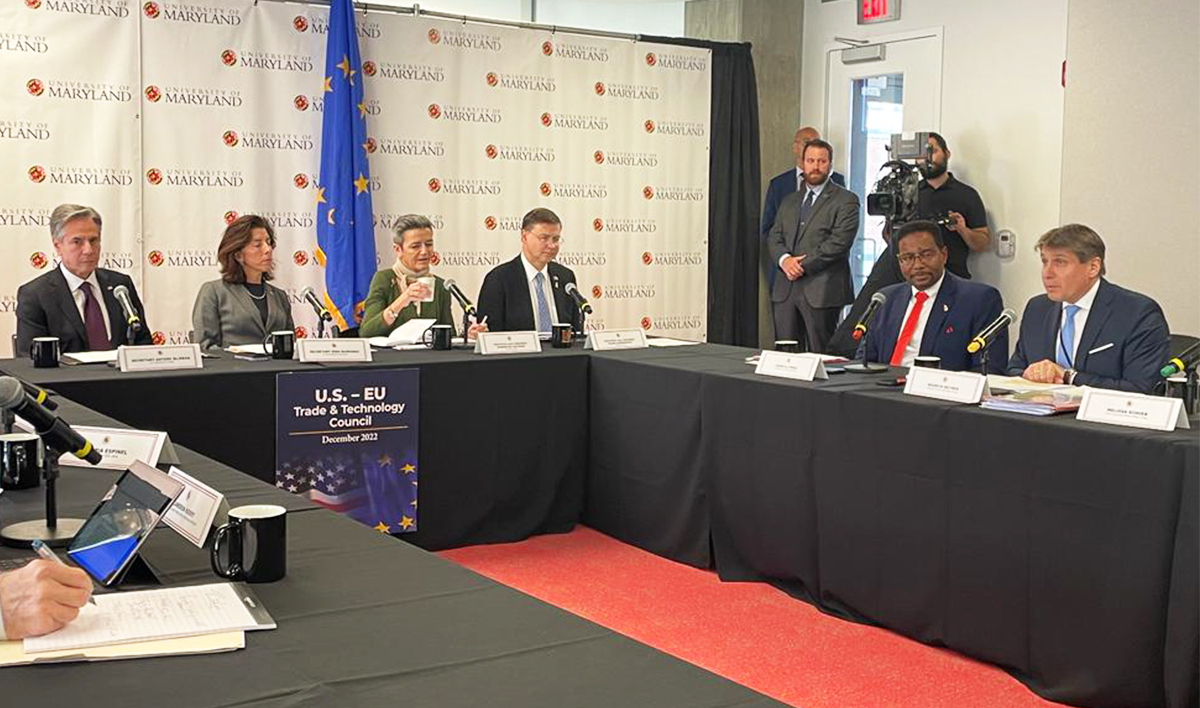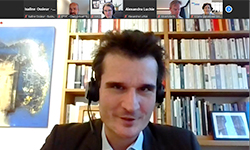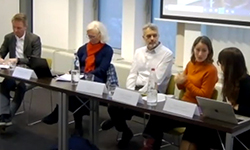BusinessEurope Headlines No. 2022-38
EU-U.S. Trade and Technology Council: addressing discriminatory measures in Inflation Reduction Act and improving EU-U.S. relations

BusinessEurope Director General Markus J. Beyrer and Deputy Director General Luisa Santos participated on 5 December in the first meeting of the EU-U.S. Trade and Labour Dialogue and the Trade and Technology Council (TTC) Stakeholders event in Maryland, USA. The first meeting focused mainly on cooperation on forced labour involving EU and U.S. social partners and was chaired by United States Trade Representative Ambassador Katherine Tai and European Commission Executive Vice-President Valdis Dombrovskis.
BusinessEurope raised that (a) we need to have coordinated approaches on fighting forced labour to avoid disruption in our supply chains; (b) it’s key to make sure we use all available trade tools including trade agreements to convince trading partners to do more; (c) exchange of information between governments and social partners is key; and (d) reliable information about what is happening on the ground is important to support companies, especially SMEs, in their compliance/ due diligence activities.
The TTC Stakeholders event, later that day, was chaired by State Secretary Anthony Blinken, Commerce Secretary Gina Raimondo and USTR Katherine Tai on the U.S. side and European Commission Executive Vice-Presidents Margrethe Vestager and Valdis Dombrovskis on the EU side. BusinessEurope's representatives highlighted that (a) we need to urgently address the discriminatory provisions in the U.S. Inflation Reduction Act, especially on electric vehicles; (b) we need to enhance coordination on export controls especially when it comes to China as we need to ensure European interests are taken into account; (c) we need to increase and expand regulatory cooperation leading to more mutual recognition agreements that are important to avoid barriers to transatlantic trade.
Contact: Catella Eleonora
The EU needs a trade agreement with Australia
 “Australia is a natural partner of the European Union despite the distance, for geopolitical and economic reasons. The Indo-Pacific is an increasingly important region from a strategic viewpoint, where Australia is well connected to booming economies through a web of trade agreements”, said BusinessEurope Director General Markus J. Beyrer at a dinner organised by the Europe Australia Business Council (EABC) with the presence of the Australian Trade Minister, Senator the Hon Don Farrell on 6 December. The two parties share values like the respect for human rights and the rule of law, and are both committed to open and fair trade. Australia also responds to the EU’s economic needs, in particular when it comes to energy, raw materials and critical minerals, and is now ready to engage constructively on trade and sustainable development. “It is of paramount importance that the EU finalises negotiations and proceeds towards the ratification process still during this political cycle”, Beyrer added.
“Australia is a natural partner of the European Union despite the distance, for geopolitical and economic reasons. The Indo-Pacific is an increasingly important region from a strategic viewpoint, where Australia is well connected to booming economies through a web of trade agreements”, said BusinessEurope Director General Markus J. Beyrer at a dinner organised by the Europe Australia Business Council (EABC) with the presence of the Australian Trade Minister, Senator the Hon Don Farrell on 6 December. The two parties share values like the respect for human rights and the rule of law, and are both committed to open and fair trade. Australia also responds to the EU’s economic needs, in particular when it comes to energy, raw materials and critical minerals, and is now ready to engage constructively on trade and sustainable development. “It is of paramount importance that the EU finalises negotiations and proceeds towards the ratification process still during this political cycle”, Beyrer added.
Contact: Catella Eleonora
Active inclusion: need for innovative approaches and involvement of multiple partners
 Work is the best way to ensure self-sufficiency, professional development and access to work-related social protection provisions. Current shortages of labour and skills in all EU Member States are acting as a bottleneck for economic growth. Shortages are present across all sectors and at different skills levels. In 2021, almost 70% of employers reported problems and perceived this to be a major issue. A growing number of companies are not finding people to fill their vacancies, as they are depending on a shrinking number of working-age workers and the available workforce does not possess the skills required for these jobs. This also has an impact on the job creation potential. At the same time, a significant number of working-age people remain inactive: one in four working-age person in the EU is inactive and the inactivity rate exceeds 30% in five EU Member States. Different approaches to active inclusion were the topic discussed on 8 December at the joint EU Social Partners webinar. European Commission officials, researchers and national social partners presented different national approaches to active inclusion. The discussions included insights on national minimum income schemes, in-work benefits as well as active labour market policies combined with supporting measures and enabling services. The role of social economy and sheltered employment as a stepping-stone to the open labour market was also mentioned. Targeted measures addressed to the representatives of various vulnerable groups are crucial for long-lasting labour market effects.
Work is the best way to ensure self-sufficiency, professional development and access to work-related social protection provisions. Current shortages of labour and skills in all EU Member States are acting as a bottleneck for economic growth. Shortages are present across all sectors and at different skills levels. In 2021, almost 70% of employers reported problems and perceived this to be a major issue. A growing number of companies are not finding people to fill their vacancies, as they are depending on a shrinking number of working-age workers and the available workforce does not possess the skills required for these jobs. This also has an impact on the job creation potential. At the same time, a significant number of working-age people remain inactive: one in four working-age person in the EU is inactive and the inactivity rate exceeds 30% in five EU Member States. Different approaches to active inclusion were the topic discussed on 8 December at the joint EU Social Partners webinar. European Commission officials, researchers and national social partners presented different national approaches to active inclusion. The discussions included insights on national minimum income schemes, in-work benefits as well as active labour market policies combined with supporting measures and enabling services. The role of social economy and sheltered employment as a stepping-stone to the open labour market was also mentioned. Targeted measures addressed to the representatives of various vulnerable groups are crucial for long-lasting labour market effects.
Contact: Anna Kwiatkiewicz
How to create synergies between environmental and trade agendas
 “European companies face competition from countries that do not share the same level of commitment on environmental protection. We want third countries to raise their level of ambition both at multilateral level (this was BusinessEurope’s position for the COP27) and in bilateral trade agreements, through robust trade and development chapters in EU FTAs”, said BusinessEurope Deputy Director for International Relations Eleonora Catella at the conference "Paths to sustainable trade: mini or multilateralism?", organised by the Centre for Security, Diplomacy and Strategy (CSDS) and the Centre for Environment, Economy and Energy, in cooperation with the Délégation Générale du Québec à Bruxelles (DGQB) on 5 December. To incentivise sustainable trade, we need to look beyond the liberalisation of goods through tariff reductions. Much can be achieved with standardisation (international standards would allow interoperability and economies of scale) or transparent rules for “green” procurement. “Companies also need visibility on prospect regulation and a stable regulatory environment to plan investment and to bring to the market innovative, green solutions”, Catella concluded.
“European companies face competition from countries that do not share the same level of commitment on environmental protection. We want third countries to raise their level of ambition both at multilateral level (this was BusinessEurope’s position for the COP27) and in bilateral trade agreements, through robust trade and development chapters in EU FTAs”, said BusinessEurope Deputy Director for International Relations Eleonora Catella at the conference "Paths to sustainable trade: mini or multilateralism?", organised by the Centre for Security, Diplomacy and Strategy (CSDS) and the Centre for Environment, Economy and Energy, in cooperation with the Délégation Générale du Québec à Bruxelles (DGQB) on 5 December. To incentivise sustainable trade, we need to look beyond the liberalisation of goods through tariff reductions. Much can be achieved with standardisation (international standards would allow interoperability and economies of scale) or transparent rules for “green” procurement. “Companies also need visibility on prospect regulation and a stable regulatory environment to plan investment and to bring to the market innovative, green solutions”, Catella concluded.
Contact: Catella Eleonora
A banking package for strong European corporates and banks
 One of the objectives of the Banking Package regarding the implementation of the international banking rules of Basel III, should be that banks can continue supporting European businesses, BusinessEurope and the European Banking Federation (EBF) argued in a joint letter. The EU legislator, which is currently discussing the rules, should not limit proposed transitional arrangements and supporting factors for infrastructure projects and SME loans. BusinessEurope and the EBF also warned that capital charges for so-called “brown exposures” would limit the capacity of companies to finance their green transition and detract funds from the European economy at large. A strong corporate sector in Europe is essential for economic growth and to meet the ambitious goals of the green and digital transition.
One of the objectives of the Banking Package regarding the implementation of the international banking rules of Basel III, should be that banks can continue supporting European businesses, BusinessEurope and the European Banking Federation (EBF) argued in a joint letter. The EU legislator, which is currently discussing the rules, should not limit proposed transitional arrangements and supporting factors for infrastructure projects and SME loans. BusinessEurope and the EBF also warned that capital charges for so-called “brown exposures” would limit the capacity of companies to finance their green transition and detract funds from the European economy at large. A strong corporate sector in Europe is essential for economic growth and to meet the ambitious goals of the green and digital transition.
![]() Contact: Berggren Erik
Contact: Berggren Erik
Calendar 
- 14 December: EU-Philippines Business Roundtable
- 16-20 January: World Economic Forum 2023
Not yet a subscriber? Register here.
Reminder: please have a look at our privacy policy